6 best on-demand software solutions for mobility businesses in 2025
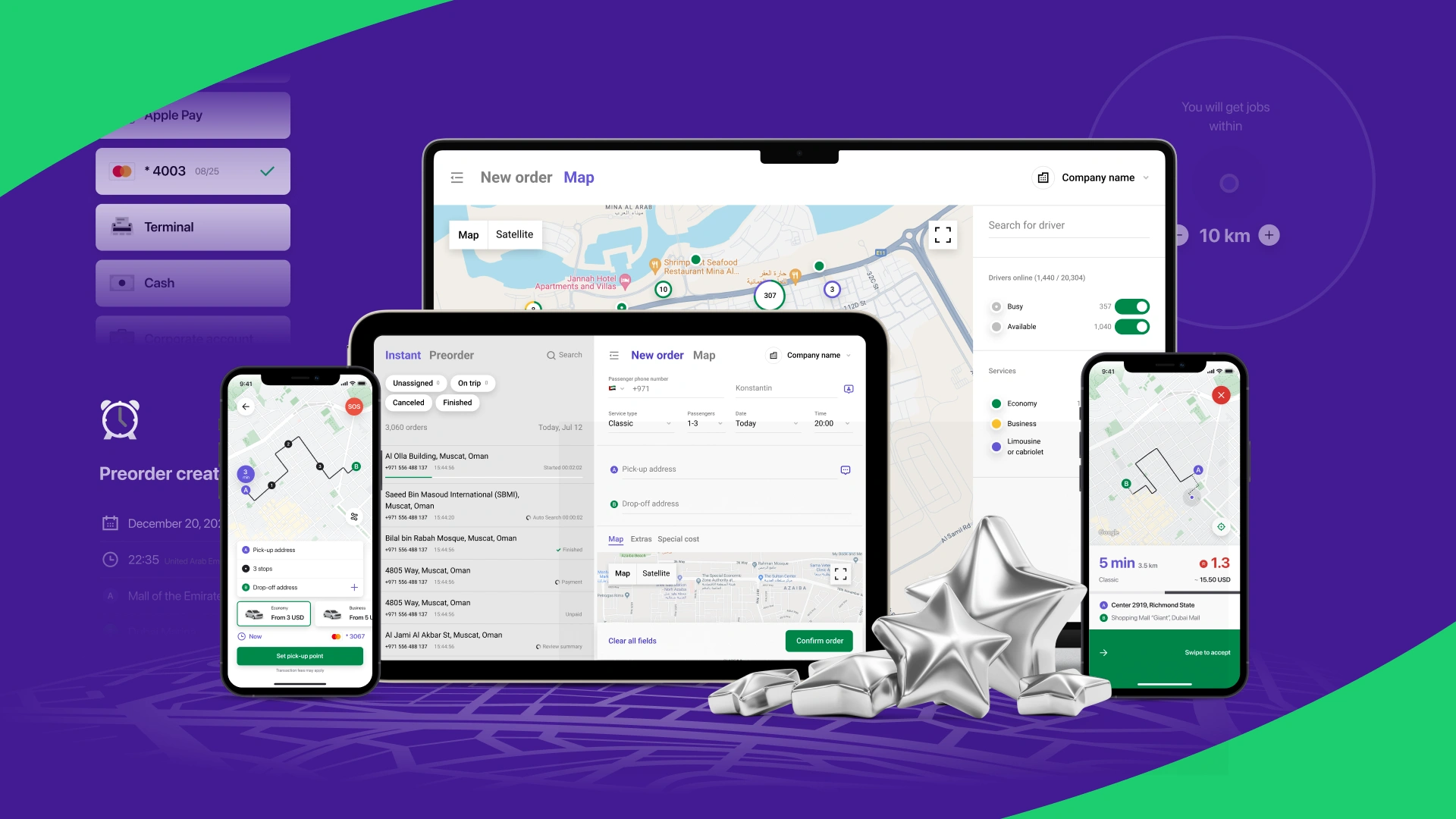
Introduction
Mobility tech platforms make or break an on-demand business. Fleet management and dispatch software help businesses assign, track, and optimize rides, tasks, or deliveries in real time. White-label mobile apps turn calling a cab or ordering groceries into a habit. Convenience and gamification attract new customers and keep existing ones engaged, while drivers and couriers use the app to earn a stable income and work according to their own schedules.
The rise of the on-demand app economy is a well-documented trend - the global on-demand economy is projected to reach $335 billion by 2025, a significant increase from $75 billion in 2020, according to industry reports.
Be it ride-hailing, delivery, healthcare, or anything else, an on-demand business can’t survive without technology.
This article lists the top 6 digital solutions for on-demand businesses worldwide.
1. Onde
Best For: Ride-hailing companies, growing taxi businesses, and mobility services automating their operations and looking to attract more users and add new services.
Onde is a leading mobility platform with an efficient dispatch system and a set of white-label apps designed for launching, managing, and scaling ride-hailing and mobility businesses. It includes Driver and Customer apps, a web app, real-time dispatch, and admin dashboards.
Onde allows clients to diversify their services by adding delivery services and creating a Super App. All white-label mobile apps are launched by the Onde company on app stores with free App Store Optimization services.
Key Features:
- White-label Driver and Customer apps (iOS and Android)
- 99.98% stability level and scalable infrastructure for 2M+ orders/day. One of the most stable tools on the market.
- Smart order dispatch, route optimization, multiple payment methods
- App launch support and ASO (app store optimization) included in all plans
- Safety features: SOS button, in-app chat, ratings, Follow My Ride
- Referral and marketing programs, in-app gamification features to attract users
- Modern intuitive Uber-like UX
- Performance analytics with AI recommendations for optimization
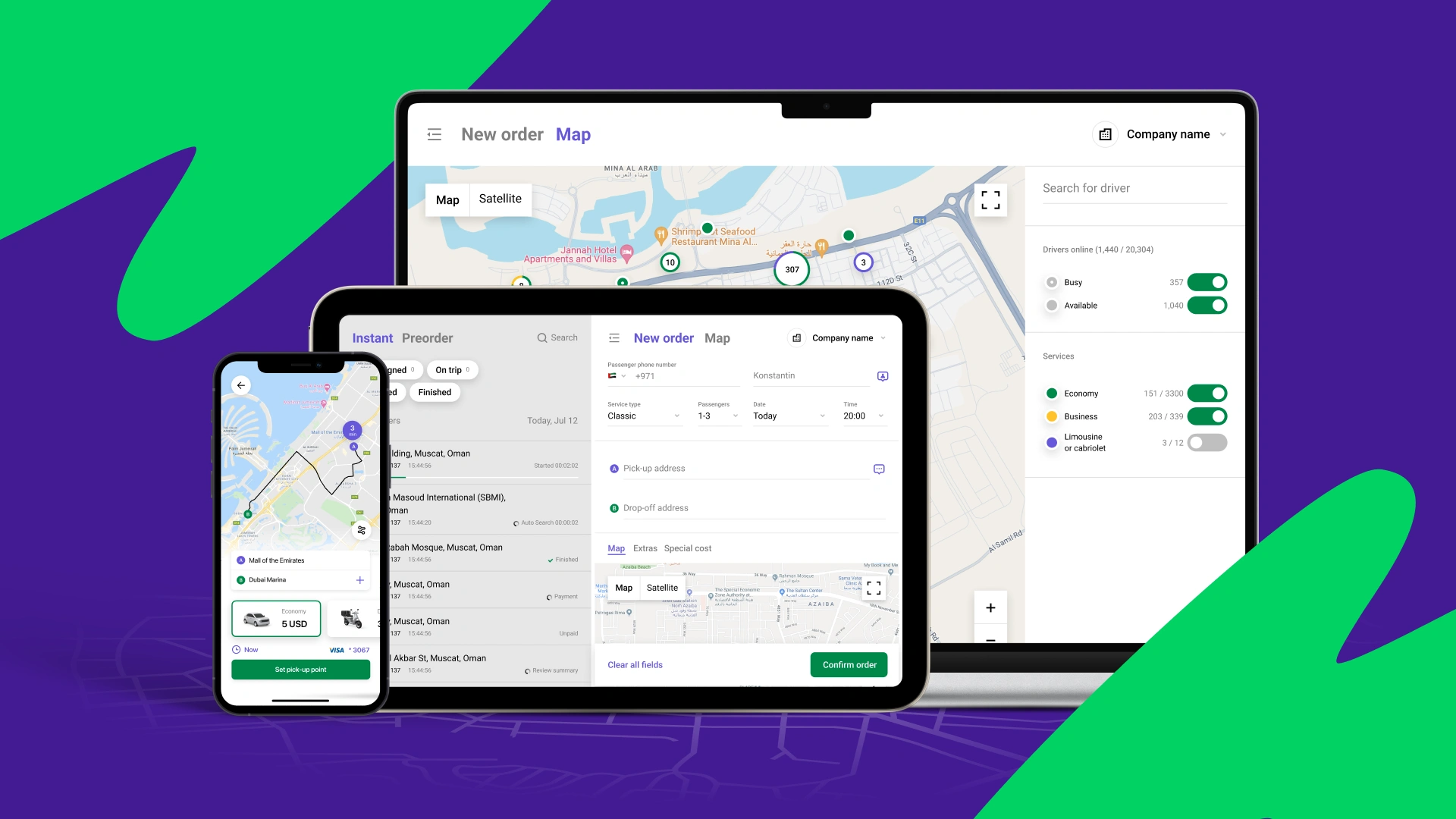
Strengths: Onde is a stable platform that provides consistent monthly updates and 24/7 support with a dedicated account manager. It’s perfect for non-tech clients who require a ready-made solution that will solve all their technology changes for them, from setting up the system to launching on app stores.
Weaknesses: Limited room for deep customization and addition of unique features. Primarily focused on taxi/delivery models — not NEMT‑specific.
Pricing: One-time setup fee, then flexible revenue-share or fixed monthly model; unlimited fleet size included. No extra charges. Complete set of apps available in each plan, along with ASO, app branding, and launching in app stores.
Onde vs on-demand software solutions
Feature | Onde | Other on-demand software solutions |
Branded iOS + Android apps included | ✅ Yes | ❌ White-labelling often at extra cost |
Regular feature updates | ✅ For all plans | ❌ Often at extra cost or limited |
UX designed for high user retention | ✅ Yes | ❌ Often lack modern design |
Launch + app store support | ✅ Included | ❌ Rare or DIY |
Developer-free setup and maintenance | ✅ Yes | ❌ May require tech resources |
Super app abilities | ✅ Accessible via Playfood | ❌ / ✅ Depends on the solution |
Feature customization on demand | ❌ Not available | ✅ Often available at extra cost |
2. Jugnoo
Best For: Mobility businesses requiring a quick start or operators who want to try out app-based bookings.
Jugnoo offers white-label solutions for taxi, bike/car rental, airport transfer, carpool and rideshare, and taxi marketplace. Its set of apps includes mobile and web to manage booking, drivers, and customers.
Key Features:
- Driver and Customer mobile apps for iOS and Android
- White-labeling for extra cost
- International maps for extra cost
- Dispatcher dashboard with live analytics
- Dynamic pricing
- Performance reports
- Multiple payment methods and an in-app wallet
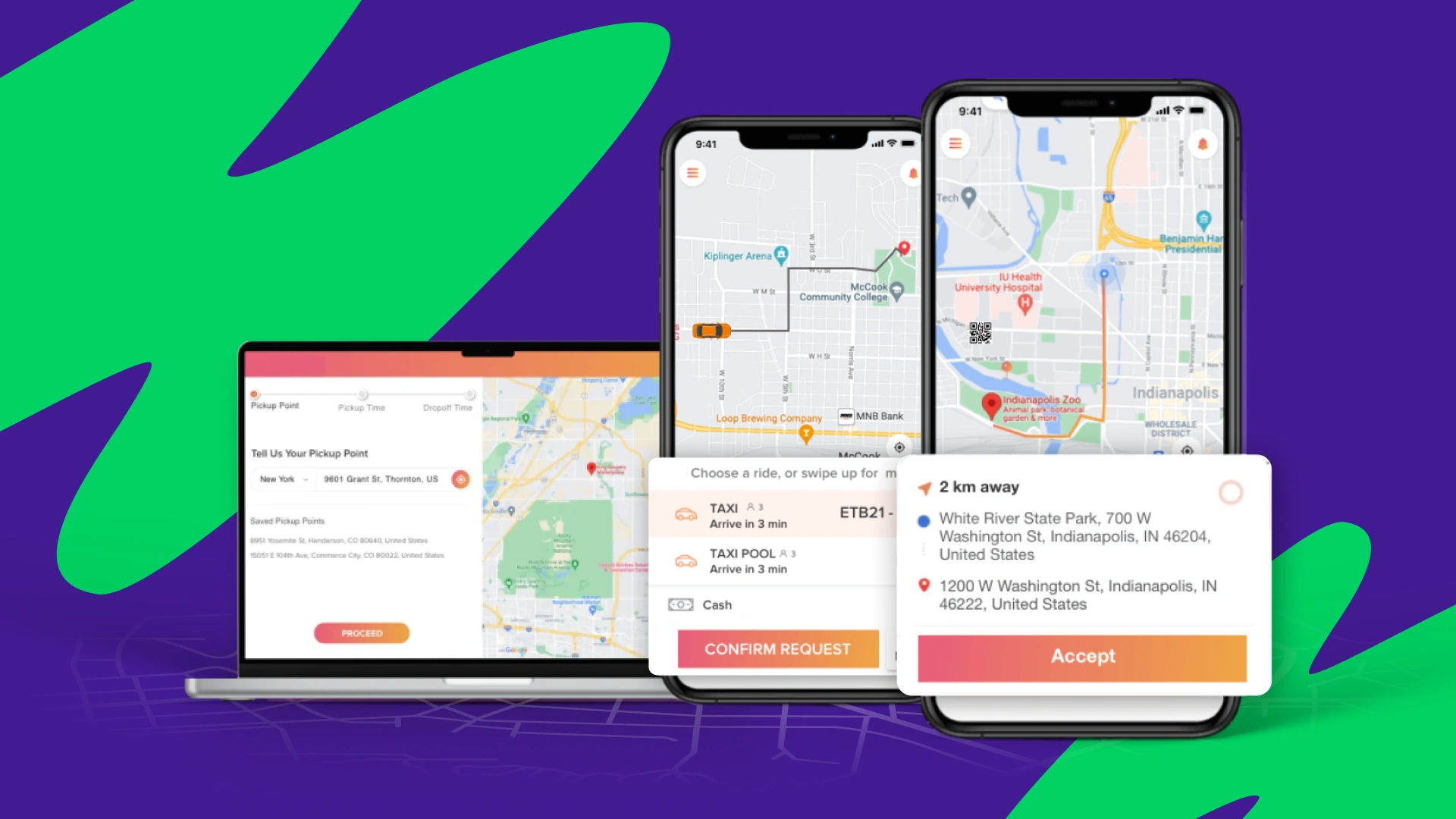
Strengths: Jugnoo offers all the essential features for a mobility business, with not many trips/orders yet.
Weaknesses: Jugnoo’s updates are not consistent, and their stability and scalability are limited. Jugnoo’s app is quite outdated, and users note problems with UX in their reports.
Pricing: Subscription + cost per ride + maintenance cost + white-label & set-up costs. All add-on features are chargeable.
3. MoveX
Best for: Medical logistics and transport providers, especially NEMT or healthcare passenger or delivery services, seeking scheduling automation and dispatch efficiency.
MoveX is a SaaS mobility platform for on‑demand and scheduled services, covering ride‑hailing, delivery, shuttle, limo, NEMT, and logistics businesses.
Key Features:
- White-label apps for riders and drivers with customizable add-ons
- Dynamic dispatch and fleet management, delivery & grocery modules
- Real-time tracking and logistics visibility
- Cashless payments, in-app chat, ratings
- Proof of delivery
- Automated documentation
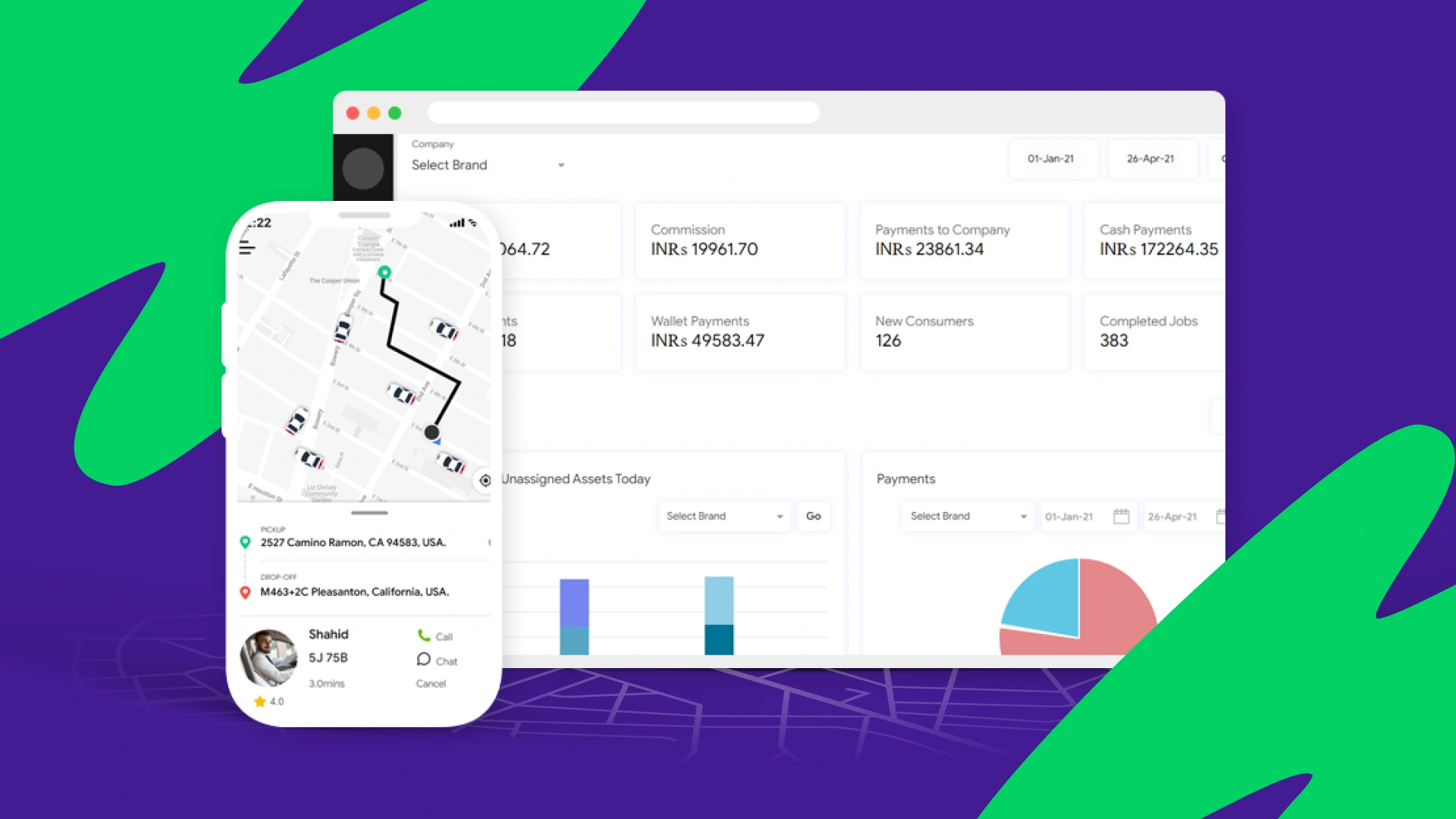
Advantages: Broadly applicable across verticals: ride-hailing, grocery delivery, NEMT. Scalable SaaS architecture for enterprises.
Disadvantages: Fewer public case studies compared to more established players.
Pricing and tiering not disclosed; quotes based on scope and may include hidden costs.
Pricing: Not publicly listed; available upon inquiry based on deployment size and features.
4. Autofleet
Best for: A medium to large fleet, ride-sharing, rental, logistics, or public transportation company that cares about sustainability and is looking to optimize fleet management and vehicle usage.
Autofleet is a fleet optimization and management platform powered by AI and big data analytics that offers a turnkey solution for launching sustainable on‑demand and scheduled fleet-based services.
Key Features:
- Customer and Driver apps for iOS and Android
- White-labelling for Customer app only (Open Source product)
- Fleet orchestration
- Route & demand forecasting
- Ride scheduling
- Optimization engine
- Support for mixed delivery and passenger use cases
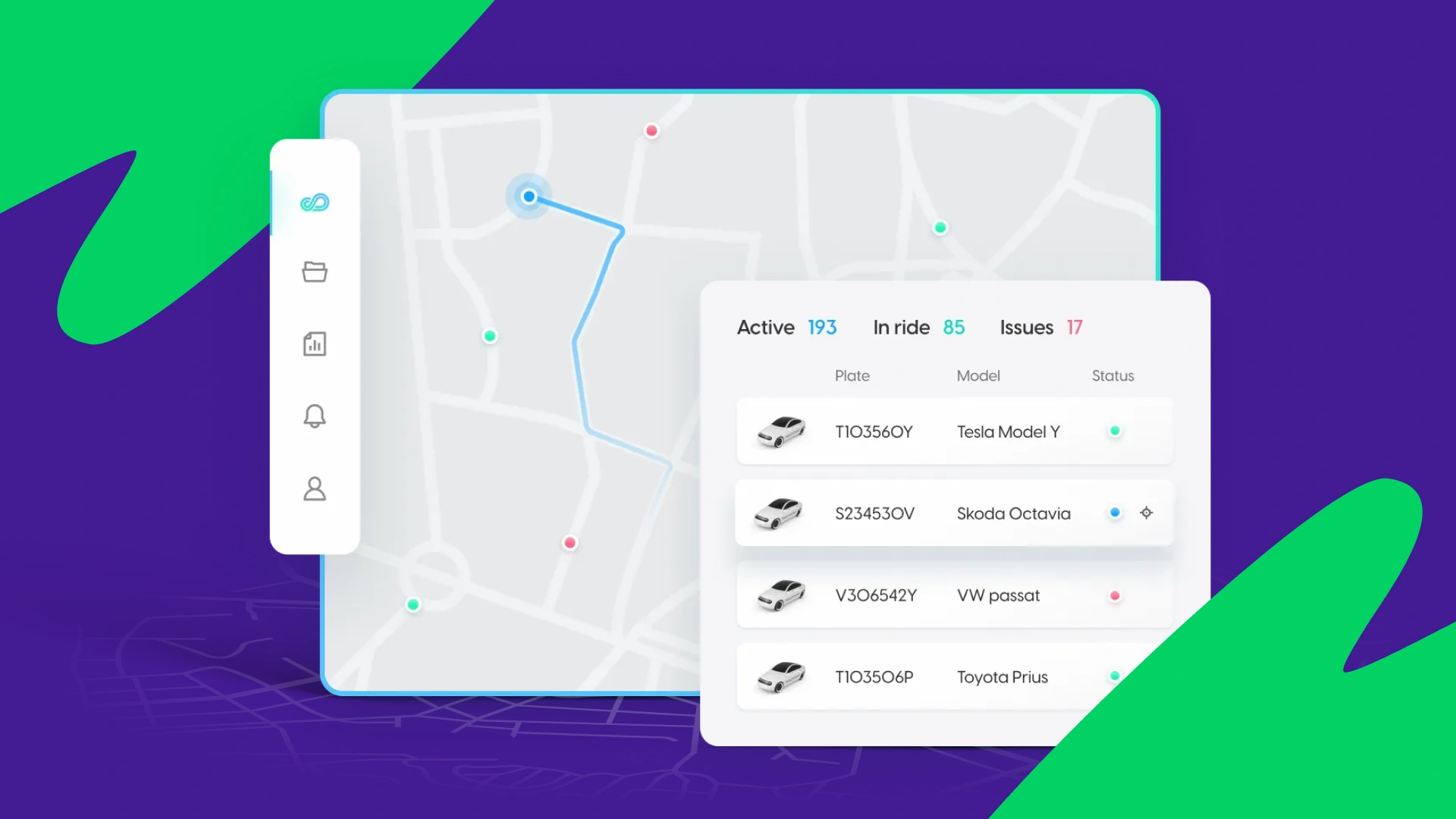
Advantages: Flexibility to run both delivery and mobility services; scalable optimization; designed for private operators launching shared fleets or delivery services.
Disadvantages: less public traction in public transit; pricing and adoption case studies are limited on the public web.
Pricing: Not disclosed publicly, available upon request.
5. Bambi
Best for: NEMT (Non‑Emergency Medical Transport) operators and small to mid-sized medical transport services.
Bambi is an AI-powered dispatch and scheduling platform targeting NEMT providers, designed to streamline paratransit and patient transport operations. It also includes the NEMT Driver app for iOS and Android that connects drivers, dispatchers, and riders for optimized operations.
Key Features:
- NEMT Driver app for iOS and Android
- Booking Portal to book trips to Bambi via an online portal
- AI-driven optimization to auto-assign and reassign NEMT trips
- Dynamic scheduling in real-time
- Real-time scheduler interface, integrated communication with drivers
- Route analysis, performance dashboards & billing tools
- Intuitive interface
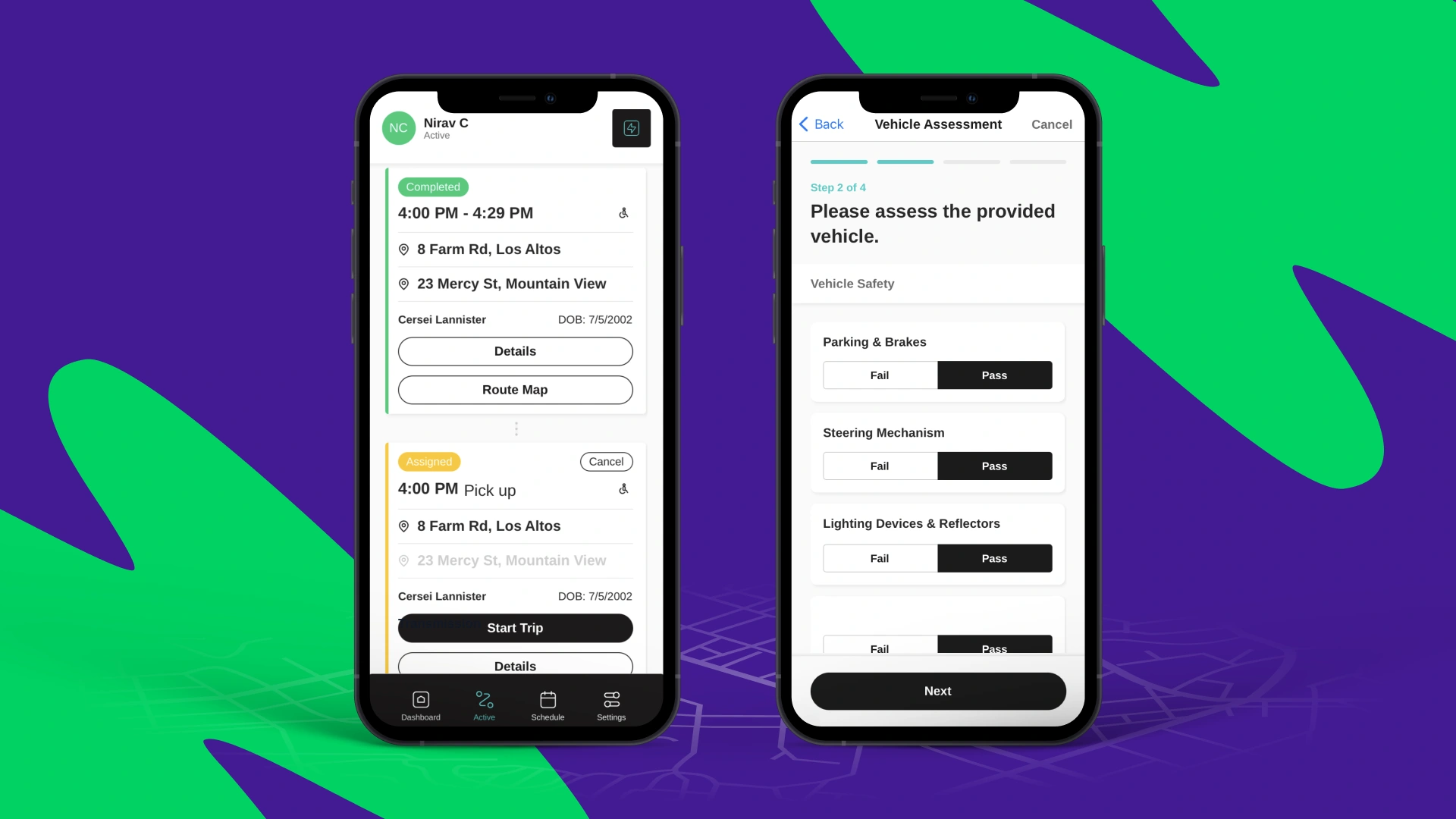
Advantages: Specifically built for NEMT; reduces manual scheduling overhead. Affordable pricing starting from ~$69/month.
Disadvantages: Not suitable for general ride-hailing or delivery
Pricing: Starts at $69/month, with pricing scaling by volume.
6. SHARE Mobility
Best for: NEMT (Non‑Emergency Medical Transport) providers; commuter & workforce transport operators; transit agencies, school districts & fleet operators.
Share Mobility is a platform built for NEMT, workforce commute and mobility programs used by municipalities, employers, and healthcare operators.
Key Features:
- Dynamic routing & scheduling for on-demand or recurring rides
- Centralized dispatch portal with real-time oversight and compliance tracking
- White-label driver and rider apps for iOS and Android
- In-app notifications, metrics on trip times, and service quality
- Strong reporting and operational analytics
- Scalability: support fleets of any size
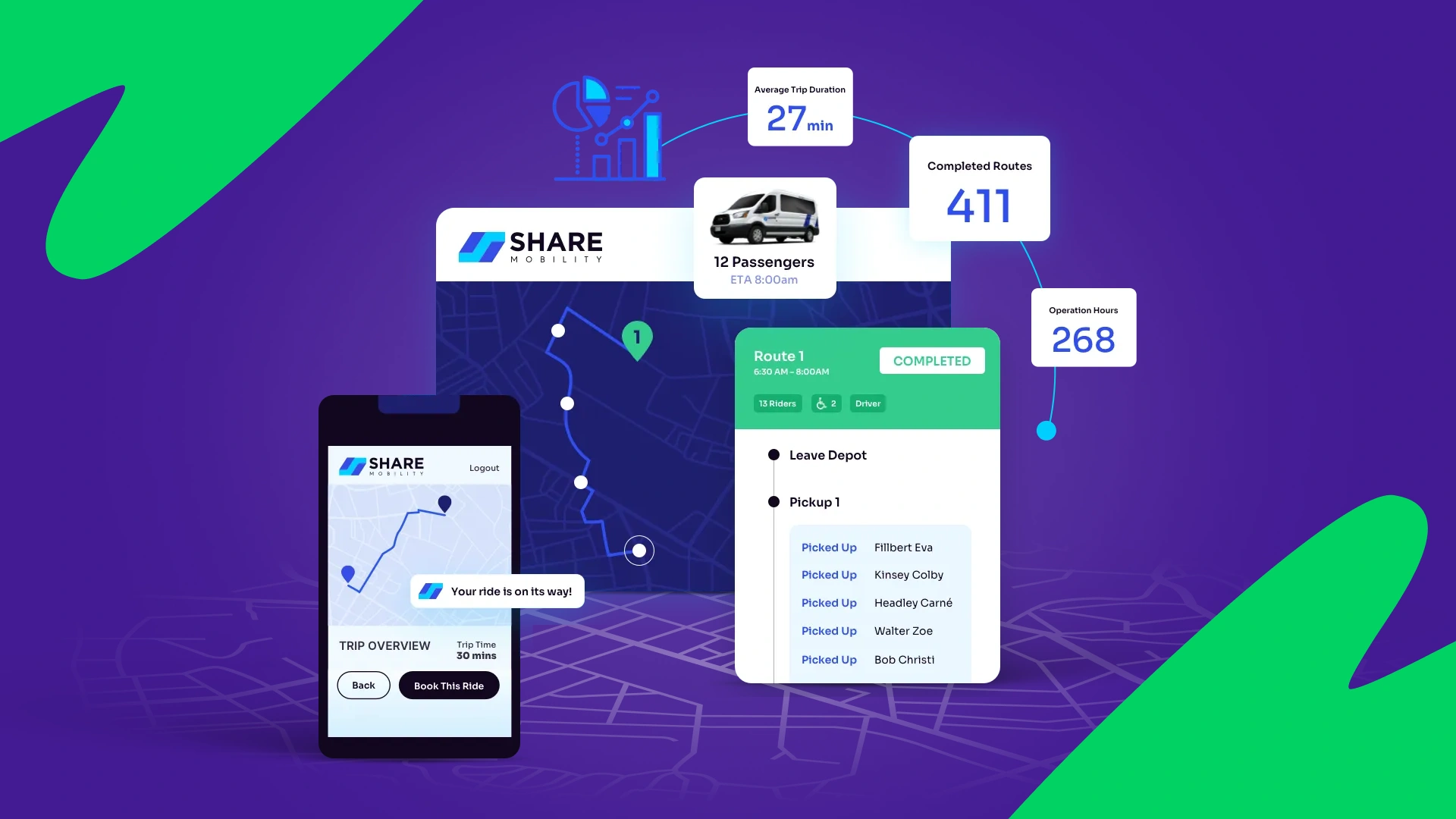
Advantages: Designed around healthcare compliance and patient punctuality. Supports flexible routing and recurring scheduling patterns
Disadvantages: Not intended for ride‑hail or grocery delivery services
Pricing: Available via direct sales. Pricing is based on fleet size, feature set, and service scope.
What to Consider When Choosing an On-Demand Software Solution for Your Mobility Business?
Selecting the right on-demand platform depends on your service type, growth goals, and operational needs. Here are the key factors to consider:
1. Business Model Compatibility
Choose a platform built for your specific vertical:
- Ride-hailing and/or delivery
- NEMT (Non-Emergency Medical Transport)
- Car-sharing or corporate shuttles
2. Customization vs. SaaS white-label platforms
- Looking for a ready-made solution that takes care of launch, updates, and maintenance and requires no tech skills or in-house developers on your side? Choose turnkey SaaS tools like Onde or MoveX.
- Need deeper customization and unique features for your mobility platform? Opt for platforms like Autofleet or SHARE Mobility.
3. Scalability & Flexibility
Make sure the software can grow with your business, especially if you plan to expand into multiple zones, verticals, or vehicle types.
Look for platforms that guarantee uptime of at least 98%. If this information is publicly available on their website and you don’t see complaints about crashes or outages in third-party reviews, that's a great sign. If not, the platform might cause you huge losses through glitches and downtimes.
4. Pricing Transparency
Look for clear pricing models. Some solutions, like Bambi or Onde, offer flat-rate monthly pricing, while others require custom quotes based on fleet size or trip volume, which might hinder your growth as the solution will get more expensive with time.
5. Customer Support
Strong onboarding and technical support are essential to long-term success. Look for tools that offer ongoing support, preferably with a personal account manager to help you alongside your ride as a business owner.
Final Tip:
Match the platform's core strengths with your most critical pain points — whether that’s operational efficiency, user growth, or speed to market. A well-aligned software is crucial for your mobility business’s success.
